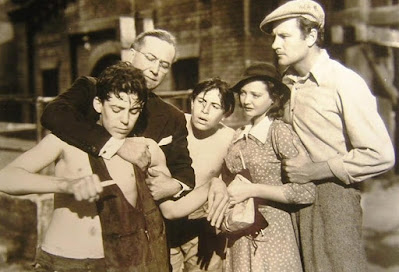When I was growing up, I watched far too much TV. But, by golly, I watched good stuff. In Sarasota, Channel 44 not only showed Creature Feature on Saturday afternoons, but they also had weekend showings of film series such as Charlie Chan, Abbott and Costello and the Bowery Boys.
I had no idea growing up that the slapstick young hooligans in the Bowery Boys movies had begun their film careers playing more serious juvenile delinquint roles. Though Channel 44 also occasionally showed the Warner Brothers gangster films, I missed seeing Dead End and Angels with Dirty Faces until I was a little older.
Dead End (1937) had been a successful play on Broadway. William Wyler directed the film version, using an elaborate set to recreate a dirty New York City slum. The movie used a number of the same actors that had appeared in the play, including most of the kids.
The movie's actions cover about a day and there's no strong plot thread running through it. Instead, it follows a series of characters through their different arcs. And this works. The acting, dialogue, sets and direction all come together to create a fascinating Day in the Life of a Slum.
The future Bowery Boys (then called the Dead End Kids) are a youthful gang that has nothing constructive to do and usually end up causing trouble. One of those kids is Tommy (Billy Halop), who lives with his older sister Drina (Sylvia Sidney). Drina is desperate to care for Tommy and raise him right, but he continues to drift into trouble.
Drina, by the way, as a thing for Hank (Joel McCrea), an out-of-work architect who has resisted the temptation to go bad while growing up in the slums, but apparently has nothing to show for it. Hank, though, might have a thing for a rich girl. He's apparently oblivious to Drina's obvious interest in him. Since I've been told that I was dating my now-wife Angela for a year before I myself realized we were dating, I am not in a position to criticize Hank.
But then a rare "successful" graduate of the slum returns for a visit. Humphrey Bogart was a rising star at the time, but still being cast largely as gangsters. And, though I'm more than pleased he eventually he moved on to Sam Spade, Rick Blaine, Fred C. Dobbs and Captain Queeg, he was really, really good in those gangster roles. His performance as "Baby Face" Martin is arguably his best bad guy work from the 1930s.
Martin is obviously modeled on the well-known gangsters of that era. He's got money, but he's also wanted by every cop in the country for at least eight murders. He has no home and he can never let down his guard. He's come home to the slums to see his mother and his first girl friend--he misses the stability of home and family (even if that home is in a terrible place) without being able to explain even to himself why he misses it.
But he won't find what he's looking for. His mother has nothing but contempt for him and his first love is now a TB-ridden prostitute. For Martin, you can't go home again.
All these character arcs come together at the end. We are shown that a life of violence never ends well and that it is wiser to make better (if much harder) moral choices. But we're also shown that making those good choices doesn't guarantee anything, since life is notoriously unfair.
The best example of this is how the movie ends, so I'm going to have to include some spoilers here. At one point, the kids beat up a rich boy who lives in a nearby hotel, stealing his watch and his jacket. There's no real reason for doing this--the thefts are an afterthought. This random act of violence is just something they did for fun.
When the boy's father grabs Tommy. Tommy panics, scratches the man's hand with a pen knife and runs. The father turns out to be the brother of an important judge and demands Tommy be caught.
Later, Tommy turns himself in. Drina pleads with the father not to press charges. We had gotten the impression earlier that the father was acting out of pure anger and perhaps even snobbery, but now discover that he believes that Tommy needs to go to reform school to protect any future potential victims from getting hurt. He acknowledges that if Tommy is locked up, he might come out worse than before (though I like a line of dialogue where he points out that this is Tommy's choice). But his concern for justice for his son and protecting others is sincere. The movie, I think, comes down on Drina's side--to give Tommy a break--but it is not unsympathetic to the father's equally legitimate viewpoint.
The movie has a social point to make in that those born poor are often in an apparently inescapable trap. But it also stresses the importance of individual responsibilities and individual choice. It quite properly recognizes that both these things are true at the same time.















No comments:
Post a Comment